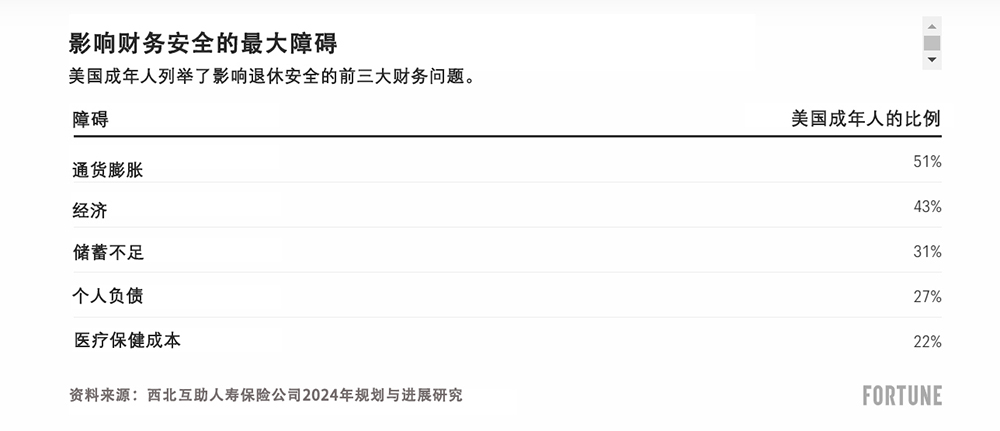
通货膨胀、高利率、动荡的就业市场和新冠疫情,让美国成年人对个人财务状况感到更加焦虑,有更多的人称他们对个人财务状况的安全感,跌至十多年来的最低谷。但他们也表示,今年仍然计划进行消费,包括外出就餐、度假和参加其他形式的娱乐活动。
这是西北互助人寿保险公司(Northwestern Mutual)的“2024年规划与进展研究”(2024 Planning and Progress Study)的一些结果。该项研究在今年1月调查了4,588名美国成年人。有三分之一(33%)的受访者表示在财务方面缺乏安全感,高于2023年的27%,并且达到了自2012年西北互助人寿保险公司开始进行财务安全调查以来的最高水平。只有41%的受访者称在财务方面非常有安全感,这是该报告历史上的最低水平。
西北互助人寿保险公司的首席客户官克里斯蒂安·米切尔在关于此次调查的新闻发布会上指出,出现这种趋势有很多原因。虽然从通胀降温、失业率更低和股市暴涨等传统指标来看,美国经济目前似乎更加强劲,但许多美国人的担忧依旧挥之不去。自2020年以来,美国人经历了导致失业率飙升的新冠疫情、创数十年新高的通货膨胀,还有利率上涨。争论不休的总统大选和动荡的全球局势,可能有害无利。
“很难有积极的心态”
最近的偏见正在影响许多美国人,尤其是在面对物价上涨的时候。报告称,通货膨胀“是导致这种不安全感显而易见的原因”,它让许多积极的经济新闻黯然失色。一半以上的美国成年人认为,通货膨胀是影响财务安全感的最大障碍。
2022年年中,美国的通胀率达到9%,创40年新高,而且目前仍旧高于美联储(Federal Reserve)2%的目标。尤其是高企的食品价格和房价,让美国人的预算捉襟见肘:过去三年,食品价格上涨了两位数,而房价更是达到史上最高水平。
虽然最近通胀有所回落,但一半以上的受访者预计通胀率会继续升高,而且只有9%的家庭表示其收入增长速度更快。美联储称,美国人希望物价恢复到新冠疫情之前的水平,但这并没有发生。
米切尔在新闻稿里说:“‘财务冲击疲劳’和脆弱,让人们很难对个人财务安全有积极的心态。尽管经济持续增长,但在过去几年,美国人却不得不忍受一次次的财务动荡,当你不知道接下来会发生什么时,就很难保持积极的心态。”

美联储为了控制通胀而启动的加息,加剧了美国人对经济的悲观立场。米切尔指出,年轻的千禧一代和Z世代背负债务或借款的成本变得更高。
2023年,美国的信用卡债务总额首次超过1万亿美元(部分原因是通货膨胀),而且依然在持续增长,因此这个问题变得尤其重要。Credit Karma的数据显示,年轻人受到的影响最为严重。
LendingClub的首席客户官马克·埃利奥特最近对《财富》杂志表示:“这些消费者日益依赖信贷度日。一个人背负的债务水平更高,会阻碍其实现财务目标,而且会给经济健康和心理健康带来长期风险。”
此外,抵押贷款利率和租金对消费者信心的影响,难以用语言来形容。据Redfin统计,抵押贷款中位数月还款额从2021年的1,500美元提高到超过2,600美元,而目前房东公开报价的租金自新冠疫情以来上涨了30%。更多美国人没有条件进入房地产市场,同时每个月要支付的房租也越来越高。
经济学家们可能低估了加息对消费者的伤害。包括美国财政部的前部长拉里·萨默斯在内的一批研究人员发表的最新工作报告发现,美国劳工统计局(Bureau of Labor Statistics)的官方消费物价指数,并没有充分考虑加息导致债务增多的情况,尤其是抵押贷款,还有汽车贷款和信用卡债务。如果新通胀指标中将加息考虑在内,消费者信心就会与生活成本上涨的趋势更加匹配。
报告的作者表示:“消费者不同于现代经济学家,他们会把借款成本作为生活成本的一部分。”而且“自2021年以来,普通住宅30年期抵押贷款的利息增加了三倍以上。”
“有计划消费”
与此同时,美国人不见得计划减少支出。即使在高物价和高利率的环境下,消费也使得美国经济得以维持增长。报告发现,59%的成年人表示在2024年,非必需品消费将维持不变甚至增加。Z世代最有可能表示不会减少支出,而X世代最有可能控制支出。
米切尔提到了美联储最近的一份报告。这份报告显示自新冠疫情爆发以来,40岁以下美国人的资产净值增长速度最快。反过来,他们可能对自己的消费能力和实现其他目标的能力更有信心,例如储蓄和投资目标等。
他还指出,美国人的财务安全感和继续消费的计划之间貌似出现了脱节,这是在警告消费者不要忽视长期后果。
米切尔告诉《财富》杂志:“如果把美好的事物或体验作为合理理财计划的一部分,那么犒劳自己就会让你感觉很棒,但如果这是计划外的支出,任何情感收益就都会很短暂,甚至适得其反。我的建议是:如果你想要挥霍一番,那就去做,但要将它们纳入计划,这样可以保证你的财务安全感,而不会让你对它们产生内疚感。”(财富中文网)
译者:刘进龙
审校:汪皓
通货膨胀、高利率、动荡的就业市场和新冠疫情,让美国成年人对个人财务状况感到更加焦虑,有更多的人称他们对个人财务状况的安全感,跌至十多年来的最低谷。但他们也表示,今年仍然计划进行消费,包括外出就餐、度假和参加其他形式的娱乐活动。
这是西北互助人寿保险公司(Northwestern Mutual)的“2024年规划与进展研究”(2024 Planning and Progress Study)的一些结果。该项研究在今年1月调查了4,588名美国成年人。有三分之一(33%)的受访者表示在财务方面缺乏安全感,高于2023年的27%,并且达到了自2012年西北互助人寿保险公司开始进行财务安全调查以来的最高水平。只有41%的受访者称在财务方面非常有安全感,这是该报告历史上的最低水平。
西北互助人寿保险公司的首席客户官克里斯蒂安·米切尔在关于此次调查的新闻发布会上指出,出现这种趋势有很多原因。虽然从通胀降温、失业率更低和股市暴涨等传统指标来看,美国经济目前似乎更加强劲,但许多美国人的担忧依旧挥之不去。自2020年以来,美国人经历了导致失业率飙升的新冠疫情、创数十年新高的通货膨胀,还有利率上涨。争论不休的总统大选和动荡的全球局势,可能有害无利。
“很难有积极的心态”
最近的偏见正在影响许多美国人,尤其是在面对物价上涨的时候。报告称,通货膨胀“是导致这种不安全感显而易见的原因”,它让许多积极的经济新闻黯然失色。一半以上的美国成年人认为,通货膨胀是影响财务安全感的最大障碍。
2022年年中,美国的通胀率达到9%,创40年新高,而且目前仍旧高于美联储(Federal Reserve)2%的目标。尤其是高企的食品价格和房价,让美国人的预算捉襟见肘:过去三年,食品价格上涨了两位数,而房价更是达到史上最高水平。
虽然最近通胀有所回落,但一半以上的受访者预计通胀率会继续升高,而且只有9%的家庭表示其收入增长速度更快。美联储称,美国人希望物价恢复到新冠疫情之前的水平,但这并没有发生。
米切尔在新闻稿里说:“‘财务冲击疲劳’和脆弱,让人们很难对个人财务安全有积极的心态。尽管经济持续增长,但在过去几年,美国人却不得不忍受一次次的财务动荡,当你不知道接下来会发生什么时,就很难保持积极的心态。”
美联储为了控制通胀而启动的加息,加剧了美国人对经济的悲观立场。米切尔指出,年轻的千禧一代和Z世代背负债务或借款的成本变得更高。
2023年,美国的信用卡债务总额首次超过1万亿美元(部分原因是通货膨胀),而且依然在持续增长,因此这个问题变得尤其重要。Credit Karma的数据显示,年轻人受到的影响最为严重。
LendingClub的首席客户官马克·埃利奥特最近对《财富》杂志表示:“这些消费者日益依赖信贷度日。一个人背负的债务水平更高,会阻碍其实现财务目标,而且会给经济健康和心理健康带来长期风险。”
此外,抵押贷款利率和租金对消费者信心的影响,难以用语言来形容。据Redfin统计,抵押贷款中位数月还款额从2021年的1,500美元提高到超过2,600美元,而目前房东公开报价的租金自新冠疫情以来上涨了30%。更多美国人没有条件进入房地产市场,同时每个月要支付的房租也越来越高。
经济学家们可能低估了加息对消费者的伤害。包括美国财政部的前部长拉里·萨默斯在内的一批研究人员发表的最新工作报告发现,美国劳工统计局(Bureau of Labor Statistics)的官方消费物价指数,并没有充分考虑加息导致债务增多的情况,尤其是抵押贷款,还有汽车贷款和信用卡债务。如果新通胀指标中将加息考虑在内,消费者信心就会与生活成本上涨的趋势更加匹配。
报告的作者表示:“消费者不同于现代经济学家,他们会把借款成本作为生活成本的一部分。”而且“自2021年以来,普通住宅30年期抵押贷款的利息增加了三倍以上。”
“有计划消费”
与此同时,美国人不见得计划减少支出。即使在高物价和高利率的环境下,消费也使得美国经济得以维持增长。报告发现,59%的成年人表示在2024年,非必需品消费将维持不变甚至增加。Z世代最有可能表示不会减少支出,而X世代最有可能控制支出。
米切尔提到了美联储最近的一份报告。这份报告显示自新冠疫情爆发以来,40岁以下美国人的资产净值增长速度最快。反过来,他们可能对自己的消费能力和实现其他目标的能力更有信心,例如储蓄和投资目标等。
他还指出,美国人的财务安全感和继续消费的计划之间貌似出现了脱节,这是在警告消费者不要忽视长期后果。
米切尔告诉《财富》杂志:“如果把美好的事物或体验作为合理理财计划的一部分,那么犒劳自己就会让你感觉很棒,但如果这是计划外的支出,任何情感收益就都会很短暂,甚至适得其反。我的建议是:如果你想要挥霍一番,那就去做,但要将它们纳入计划,这样可以保证你的财务安全感,而不会让你对它们产生内疚感。”(财富中文网)
译者:刘进龙
审校:汪皓
Inflation, high interest rates, a rocky job market, and the COVID-19 pandemic—they all have American adults feeling more anxious about money, with more people saying they’re the least secure about their finances in over a decade. But those same individuals also said they’re still planning to spend money on dining out and vacations and other forms of entertainment this year.
Those are some of the takeaways from Northwestern Mutual’s 2024 Planning and Progress Study, which surveyed 4,588 American adults in January. A full third of respondents, 33%, reported feeling financially insecure—up from 27% in 2023, and the highest share since Northwestern Mutual began measuring financial security in 2012. Just 41% of respondents reported feeling very financially secure, the smallest share in the report’s history.
There are any number of reasons for that, Christian Mitchell, chief customer officer at Northwestern Mutual, said at a press event for the survey. Though the economy appears stronger now according to traditional metrics like cooling inflation, lower unemployment, and a roaring stock market, many Americans have lingering concerns. Since just 2020, they’ve endured a pandemic that caused joblessness to spike, decades-high inflation, and rising interest rates. A contentious presidential election and global instability aren’t likely to help matters.
“It’s hard to feel positive”
That recency bias is weighing on many Americans, particularly when it comes to higher prices. Inflation is the “clear driver underpinning that insecurity,” according to the report, and it’s overshadowing much of the positive economic news. More than half of U.S. adults named it as the single largest obstacle to financial security.
Inflation reached 9% in mid-2022, the highest rate in 40 years, and it still remains above the Federal Reserve’s 2% target. High food and housing prices, in particular, are stretching budgets thin: Food prices are up double digits in the past three years, and housing costs have never been higher.
Though inflation has cooled recently, more than half of respondents are expecting it to keep increasing, and just 9% of households said their income is growing at a faster pace. Americans want prices back at pre-pandemic levels, the Federal Reserve has noted, but that isn’t happening.
“‘Financial shock fatigue’ and fragility are holding people back from positive feelings about their own financial security,” Mitchell said in a press release. “Despite the growing economy, Americans have had to endure one financial disruption after another over the last several years, and it’s hard to feel positive when you don’t know what’s around the corner.”
Higher interest rates—initiated by the Fed in order to combat inflation—are compounding Americans' pessimistic view of the economy. It's more expensive to have debt or borrow money for younger millennials and Gen Z than ever before, Mitchell noted.
That's especially important to consider as total credit card debt in the U.S. surpassed $1 trillion for the first time ever in 2023—partly due to inflation—and it keeps growing. Data from Credit Karma shows younger generations are getting hit the hardest.
"These consumers are increasingly relying on credit to get by," Mark Elliot, chief customer officer at LendingClub, recently told Fortune. "Higher debt levels hamper one’s ability to achieve financial goals, but also pose long-term risks to economic well-being and mental health."
Plus, it's hard to overstate how mortgage interest rates and rents are affecting sentiment. The median monthly mortgage payment has increased from $1,500 in 2021 to over $2,600, according to Redfin, while current asking-rate rents are up 30% since the start of the pandemic. More Americans have been locked out of the housing market while also paying more and more each month to rent.
And economists actually may be underestimating just how much rising rates are harming consumers. A new working paper from a group of researchers, including former Treasury Secretary Larry Summers, finds that the official consumer price index from the Bureau of Labor Statistics doesn't fully account for how much more expensive rising interest rates make debt—particularly mortgages, but also car payments and credit card debt. When rising interest rates are accounted for in a new inflation measure, consumer sentiment matches up better with the rising cost of living.
"Consumers, unlike modern economists, consider the cost of money part of their cost of living," the authors note, and "the interest payment on a new 30-year mortgage for the average house has increased more than threefold since 2021."
“Build those moments into a plan”
At the same time, Americans aren't necessarily planning to slow down their spending, which has kept the economy afloat even amid high prices and high interest rates. The report finds 59% of adults say they'll spend the same or more on discretionary purchases in 2024. Gen Z is the most likely generation to say they aren't pulling back, while Gen X is most likely to reign in spending.
Mitchell pointed to a recent report from the Federal Reserve that showed how people under 40 have seen their net worths rise the fastest in the years since the pandemic. In turn, they may feel more confident in their ability to spend and still pursue other goals, like saving and investing.
He also noted the seeming disconnect between Americans' perception of their financial security and their plans to keep spending, warning consumers not to ignore longer-term consequences.
"Treating yourself to nice things or experiences can feel great if that’s part of a sound financial plan, but if it’s not planned for, any emotional benefits may be short-lived—or even turn upside down," Mitchell told Fortune. "My advice: If you want to splurge, then splurge, but build those moments into a plan so you can feel financially secure—and not guilty—about them."






